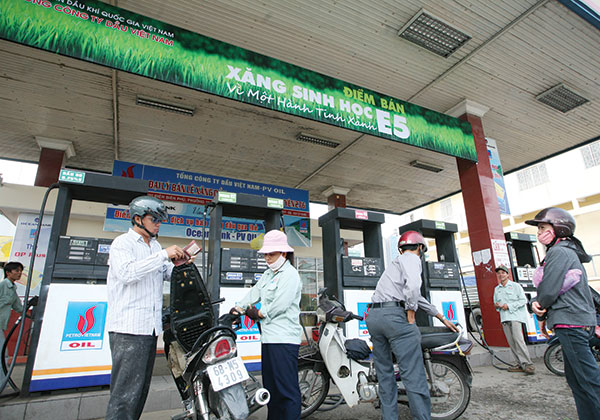PetroVietnam faces up-hill drive to promote ethanol fuel

Despite ethanol demand set to reach 8.31 billion litres by 2020, the country has lagged on adopting the bio-fuel
According to Phung Dinh Thuc, chairman of the Board of Members, the group will have one year more for preparations for the distribution of ethanol fuels in seven cities and provinces of Vietnam by the end of 2014.
“The Vietnamese government has instructed PetroVietnam and other manufacturers and distributors to keep the process on good track to the end of next year,” Thuc said.
With less than a year before the deadline, Thuc admitted that difficulties continued to hamper the use of ethanol fuels in Vietnam.
Major preparations yet to be completed are the installation of filling stations and storage facilities, as well as developing wholesale agents.
To date, PetroVietnam has five filling stations and four storage locations for ethanol fuels.
Currently, only three out of more than 10 petroleum wholesalers trade bio-fuel E5. Between them, PV Oil, Petec and SaigonPetro have a total of 175 stations selling ethanol petrol in 34 cities and provinces.
“We have seen that the process of developing distribution networks is the weak link. This bottle neck is causing difficulties for the consumption of ethanol manufacturers’ products,” Thuc said.
PetroVietnam is the investor in three ethanol factories in Vietnam located in Phu Tho, Quang Ngai and Binh Phuoc provinces which will have the combined capacity of 300,000 cubic metres per year.
Thuc confirmed that due to the lack of demand only two of the plants were presently producing, and even then, not at full capacity.
PetroVietnam’s Dung Quat ethanol plant in Quang Ngai province and the Binh Phuoc plant, a joint venture between Itochu, PetroVietnam’s affiliate PV Oil and Licogi 16, are both producing biofuels. However, due to consistent losses, Itochu is attempting to sell its stake in the Binh Phuoc plant, but has so far received no offers.
The Phu Tho ethanol plant remains under construction. Due to the lack of demand, the investors, PV Oil and a local company, asked permission to halt the operation while awaiting increased ethanol use in seven cities and provinces to increase in 2014.
The plants that are currently operational are suffering losses due to high manufacturing costs and low export prices. Current export prices stand at around VND15,000 per litre, lower than the manufacturing price of between VND17,000 to 18,000 per litre.
Thuc admitted that all of the factories were suffering, but he believed that the business would pick up in 2014 and 2015 when the new regulations are applied.
Vietnam now has a total of 13 factories planned to produce biofuels nationwide. Of those, three factories are operating and three are under construction.
According to the government roadmap, bio-fuel use will begin in December 2014 for motor vehicles in seven cites and provinces of Hanoi, Ho Chi Minh City, Haiphong, Danang, Can Tho, Quang Ngai and Ba Ria-Vung Tau. From December 2015, it will be used widely across the country.
The Ministry of Industry and Trade forecast that Vietnam will need around 6.88 billion litres of bio-fuels by 2015, with the figure climbing to 8.31 billion by 2020.
What the stars mean:
★ Poor ★ ★ Promising ★★★ Good ★★★★ Very good ★★★★★ Exceptional
Latest News
More News
- US firms deepen energy engagement with Vietnam (February 05, 2026 | 17:23)
- Vietnam records solid FDI performance in January (February 05, 2026 | 17:11)
- Site clearance work launched for Dung Quat refinery upgrade (February 04, 2026 | 18:06)
- Masan High-Tech Materials reports profit: a view from Nui Phao mine (February 04, 2026 | 16:13)
- Hermes joins Long Thanh cargo terminal development (February 04, 2026 | 15:59)
- SCG enhances production and distribution in Vietnam (February 04, 2026 | 08:00)
- UNIVACCO strengthens Asia expansion with Vietnam facility (February 03, 2026 | 08:00)
- Cai Mep Ha Port project wins approval with $1.95bn investment (February 02, 2026 | 16:17)
- Repositioning Vietnam in Asia’s manufacturing race (February 02, 2026 | 16:00)
- Manufacturing growth remains solid in early 2026 (February 02, 2026 | 15:28)
















 Mobile Version
Mobile Version